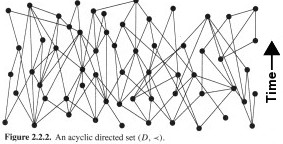 ince this is the Internet, I'd like to consider what may sound like the most
outlandish theory ever. This is just between you and me—don't tell anybody I
said this.
ince this is the Internet, I'd like to consider what may sound like the most
outlandish theory ever. This is just between you and me—don't tell anybody I
said this.
We've all heard about the multiverse, where every possibility is played out in a different universe. But what if those universes are all in our heads?
Here's the idea: events are privileged because we remember them. Every possibility happens, and history is created by which things we remember. We discriminate against things that didn't happen by forgetting them.
This theory is called modal realism. It's associated with David Kellogg Lewis, who wrote in On the Plurality of Worlds (1986) that all possible worlds exist and they are just as real as our world. Saul Kripke probably speaks for the majority of philosophers in saying that the idea was “misguided.” But a new theory in modern physics may change all that.
What is modal realism
Modal realism says that the only thing we can know for sure is what we remember. It's the opposite of radical skepticism, of the brain-in-a-vat variety, which says we can't know for sure that what we perceive is real. Radical skepticism is the other shoe dropping.
Modal realism is a radical solution to the problems created by the multiverse theory. Chief among these is the question of where these different worlds are located.

Green lava bubble on Mauna Ulu (1969). Not how we remember it
Now, you might argue that we have evidence for a unique history. If a tree falls, we have pictures of the horizontal tree on Facebook and printed copies of the repair bills for whatever it landed on. I'm not saying these are an illusion and you don't have to pay them. The events we remember act as if they were real in the sense that they affect us. In the multiverse, there's a world for every possibility, including one where the tree didn't fall and one where it fell but you didn't pay your repair bill. Modal realism (in this interpretation) says they all happened, but we only remember one causal path.
A skeptic might say we have evidence in that our recollections are shared with potentially millions of other people. Our perceptions are that the tree either did or didn't fall; it can't do both. But how do we really know this? All we really know for sure is that we remember it one way, and we remember others saying they remember the same event.

A causal network. Events don't just happen on spacetime; spacetime is actually composed of events connected by a complicated pathway called an acyclic directed set (from Dribus's book)
This is not to be confused with selective memory, where for purely personal or political reasons we decide to believe an alternative version of history. It's also distinguished from the multiverse theory, which says that all possibilities are in different universes and therefore incommensurable. In modal realism, all possibilities coexist. They're superposed, and the nature of our existence as conscious beings is to decide which one is real. Obviously this would mean that our conventional concept of space and time is different from what we commonly think. And that's what makes it interesting to physics.
For modal realism to work, there would have to be some shared connection among individuals. It provides a role for the mind in deciding what is real; we pay a price by accepting a radical transformation of our concept of space and time, as well as our concept of causation: if an event can happen without anyone's knowledge, how do we decide which version of the world it happened in? How do we reconcile this idea with our perceptions of the past are immutable?
Causal set theory
One possibility is that what we remember is not the universe itself, but its causal network structure. This structure can be fixed yet multidimensional at the same time. The main idea in causal set theory, as proposed by Rafael Sorkin, Benjamin Dribus, and others, is that information about cause and effect describes everything there is to know about relativistic spacetime geometry except for a conformal factor, i.e. scale. In this interpretation, spacetime is not so much a physical thing but a network of causes and effects. We could easily imagine that all possible events could take place on such a surface, and one's relationship to it determines which “world” we exist in.
It's a difficult concept for our minds to grasp, partly because it's so alien, and partly because many details still need to be worked out.
But there are many advantages of coexisting multiverses. For one, I can get an infinite amount of work done every week. I don't know about you, but I plan to put that on my résumé.
may 12 2018, 6:26 am

